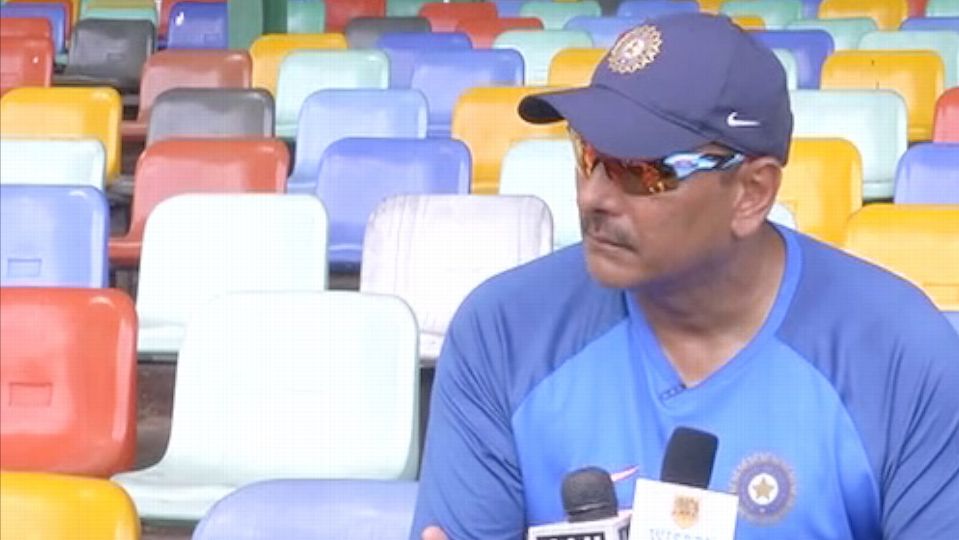 04:12
04:12
This team has already done what big names could not – Shastri
The role of a head coach in the Indian cricket team has never been as ambiguous as it has been since the first murmurs of trouble between Virat Kohli and Anil Kumble began. Kumble himself didn’t have much experience as a coach, but in the one year he spent in the job, he came across as somebody actively involved in working with bowlers, passing on some tips to batsmen, playing a role in strategising and also keeping an eye on the supply line.
However, as each passing day conspired to get Ravi Shastri back as the coach, you wondered what India wanted in their coach. Now there are specialist bowling, batting and fielding coaches in the side. If Shastri had not picked them himself, the Cricket Advisory Committee would have enforced through Zaheer Khan and Rahul Dravid. What exactly does Shastri do then?
“My role is to be in charge of the entire support staff, and to make sure that we get the boys in some great mental space to go out and express themselves with nothing else on their minds but to go out and play a brand of cricket which you have seen India play over the last three years: positive and fearless,” Shastri said, two days before the SSC Test.
When asked how exactly he does that, Shastri shot back: “That is a skill, that is why I am here and you are not there.”
Later he said, though, that all he had to do to achieve the right atmosphere in the dressing room was “walk in”. “That was enough”
It is instructive that a press conference two days before the middle Test of a series revolved more around Shastri’s role in the team than around the Test or the series. “For me, I don’t carry any baggage,” Shastri said about the winning start in Galle. “For me it was like walking into the dressing room as I had left it. Nothing had changed, and no special buttons I had to press. It was just that one play button, and off you went.
“The boys were fantastic in the last Test match but what we are striving for is improvement. There are still areas to improve from the last game. And we have discussed that and what we want from this team as a unit collectively is consistency. Not just where you are good in one game and totally the opposite in the other. Your levels of consistency have to be high.”
Shastri was even asked how he makes sure he is not “overbearing” and balancing out the need to speak to players and giving them their space. “When you have been around the game for 37 years, you probably learnt a little bit,” Shastri said. “So that experience is very handy for me in knowing exactly how to deal with the players.”
Just walk in, press the play button and using his 37-year experience (as player and commentator), coaching India sounds easy. He was asked how easy it exactly was. “I have been manager, director, now I am head coach, and it’s the same role,” Shastri said. “Absolutely the same role. So there is nothing that I have to change. The fact that you played the game and watched the game for long periods of time without a break does help. So you know what’s contemporary and what’s happening at the moment and you relate with people in that fashion.
“I don’t think at this level coaching is needed. At this level, it is all about fine-tuning and getting the blokes in a good mental space to go out and play the game. They know they have reached here because they are good. At times you might need to just fine-tune them a bit because the amount of cricket that’s being played you might just get into the odd bad habit without you realising it. That’s where the experience of having played, probably having watched you can pick it up and pass on the message.”
Shastri also said this team had achieved what many Indian greats had failed to achieve. “They have already done things that a lot of Indian teams and a lot of big names couldn’t do in their careers,” Shastri said. “Like, for example, to win a series here [in Sri Lanka] for 20 years. A lot of big names have played for 20 years, they have come to Sri Lanka many times, and they have never won a series. But they [this team] have done that. They have won a one-day series in 20 years, which a lot of teams haven’t done.
“This team is used to doing things that a lot of other teams haven’t done, and that too overseas. Forget Australia, I am not even touching the Australia tour, so when you say overseas like South Africa, England, it is a lot of tough cricket coming up. I see it as an opportunity. I am very positive here that this team can do things that probably no other Indian team has done.”
Sidharth Monga is an assistant editor at ESPNcricinfo
© ESPN Sports Media Ltd.
Source: ESPN Crickinfo
